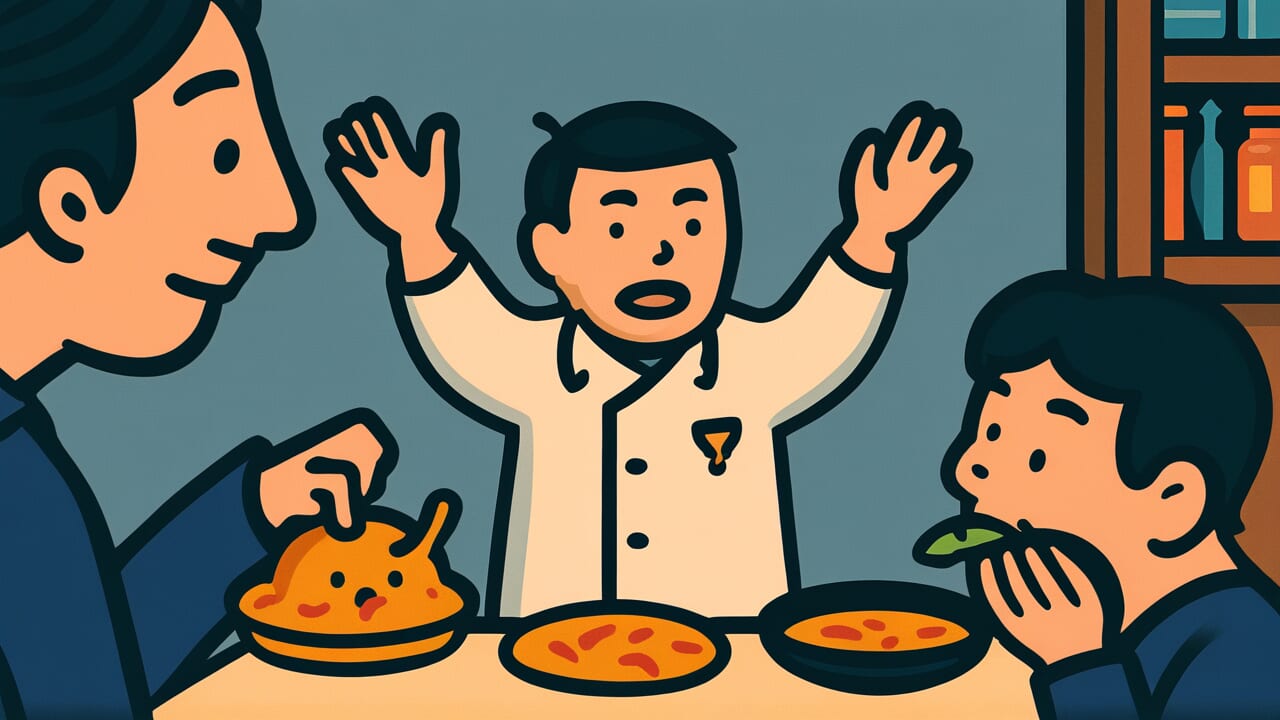How to Read “If you ask, even a demon won’t eat people”
Tanomeba oni mo hito kuwazu
Meaning of “If you ask, even a demon won’t eat people”
“If you ask, even a demon won’t eat people” means that if you ask sincerely and politely, even the coldest or strictest person will show you mercy.
The proverb teaches that even a terrifying demon that eats people can be moved by a sincere request. If that’s true for demons, it’s even more true for humans.
This proverb applies when you need to ask something from someone who seems scary, strict, or usually cold.
It teaches the importance of trying a sincere approach before giving up with thoughts like “that person is too strict, so it’s impossible.”
Even today, this wisdom applies to many situations. Making difficult requests to your boss, asking favors from business partners, or requesting help from a grumpy neighbor are all examples.
If you respect the other person’s position, explain your situation politely, and ask from your heart, you might surprisingly get their cooperation.
This proverb teaches us wisdom about human relationships.
Origin and Etymology
No clear written records exist about the origin of this proverb. However, we can make interesting observations from how the phrase is constructed.
First, let’s focus on the “demon” in this saying. In Japanese folk belief, demons are terrifying beings that eat people.
They have horns, wear tiger-skin loincloths, and carry iron clubs. They are symbols of fear itself.
In old tales, demons attack villages and torment people.
The expression that even such terrifying demons “won’t eat people” shows a typical feature of Japanese proverbs. They use extreme contrasts to emphasize their lessons.
The proverb teaches the essence of human relationships. Even the most violent and merciless beings can be moved by sincere requests.
The word “if you ask” also carries deep meaning. It’s not just about making a request.
It includes the attitude of respecting the other person and approaching them sincerely.
A popular theory suggests this saying spread during the Edo period as common wisdom. It taught people how to build relationships across social positions and ranks.
In a hierarchical society of samurai, merchants, and farmers, people deeply understood the importance of how they approached others.
Usage Examples
- That department head is strict, but “if you ask, even a demon won’t eat people,” so let’s consult him with sincerity
- I gathered courage to ask the scary-looking neighbor, and he gladly accepted. “If you ask, even a demon won’t eat people” is really true
Universal Wisdom
“If you ask, even a demon won’t eat people” teaches us a hopeful truth. Every human heart has a soft spot somewhere inside.
No matter how strict someone seems, or how cold they appear, they have emotions inside. They have a desire to respond to sincerity.
People tend to judge others by appearance and first impressions. A scary face, strict attitude, or cold manner of speaking.
From these surface elements, we decide “I can’t ask this person” or “it’s impossible.” However, this proverb teaches the importance of setting aside such prejudices and facing people sincerely.
Why has this teaching been passed down through generations? Because it touches on the most fundamental truth about human relationships.
Everyone wants to open their heart to those who respect them and treat them sincerely.
Even people who usually take strict attitudes do so because of their role or position. Essentially, they still have the ability to empathize with others.
This proverb expresses trust in human goodness. Beneath social masks, there is always human warmth.
The key to drawing out that warmth is “sincerity.” This reflects a deep understanding of human nature.
When AI Hears This
Considering whether a demon eats people through a game theory matrix reveals interesting discoveries.
Normally, a demon faces no penalty for choosing “eat.” The demon’s payoff is like “eat = +10, don’t eat = 0.” In this state, there’s no rational reason for the demon to choose not to eat.
However, the moment a human “asks,” the game structure itself changes. If the demon eats after being asked, social costs emerge like “broke a promise” or “ignored a request.”
Now the demon’s payoff becomes “eat = +10 but reputation -15, don’t eat = +5 (receive gratitude).”
In other words, asking is a strategic commitment that forcibly adds new items to the opponent’s payoff matrix.
What’s more interesting is that this change isn’t one-sided. When a human asks, the demon gains an option to acquire a new identity as “a kind being who listens to requests.”
This overlaps with what psychology calls the “consistency principle.” Once you act as a kind demon, you’re more likely to take the same action next time.
The act of the weak asking the strong doesn’t physically reduce the opponent’s options. Instead, it’s a sophisticated negotiation tactic that makes them recalculate the value of each option.
Lessons for Today
This proverb teaches modern people about the power of “sincerity” in human relationships.
Now that SNS and email communication dominate, this teaching holds fresh meaning.
Modern society emphasizes efficiency, and human relationships often become business-like. However, when making truly important requests or conducting difficult negotiations, formal exchanges won’t move hearts.
You need to understand the other person’s position, honestly convey your situation, and ask from your heart.
Especially noteworthy is how this proverb also teaches the importance of “not giving up.”
Instead of giving up from the start because someone seems strict or busy, first try facing them with sincerity.
That one step might create unexpected cooperation and understanding.
If you’re holding back from asking someone something difficult right now, remember this proverb.
With respect for the other person and your own sincerity, a path will open. Every human heart contains warmth.



Comments